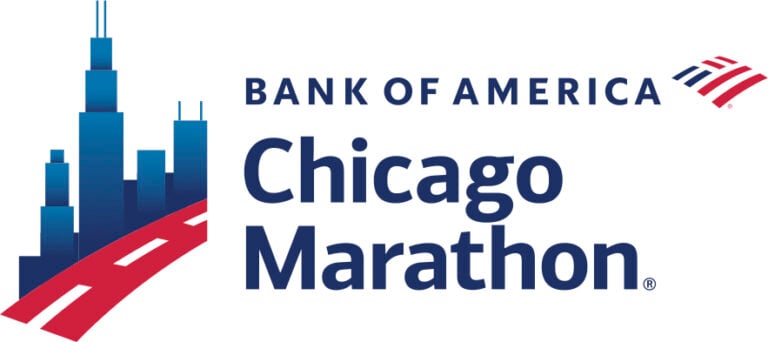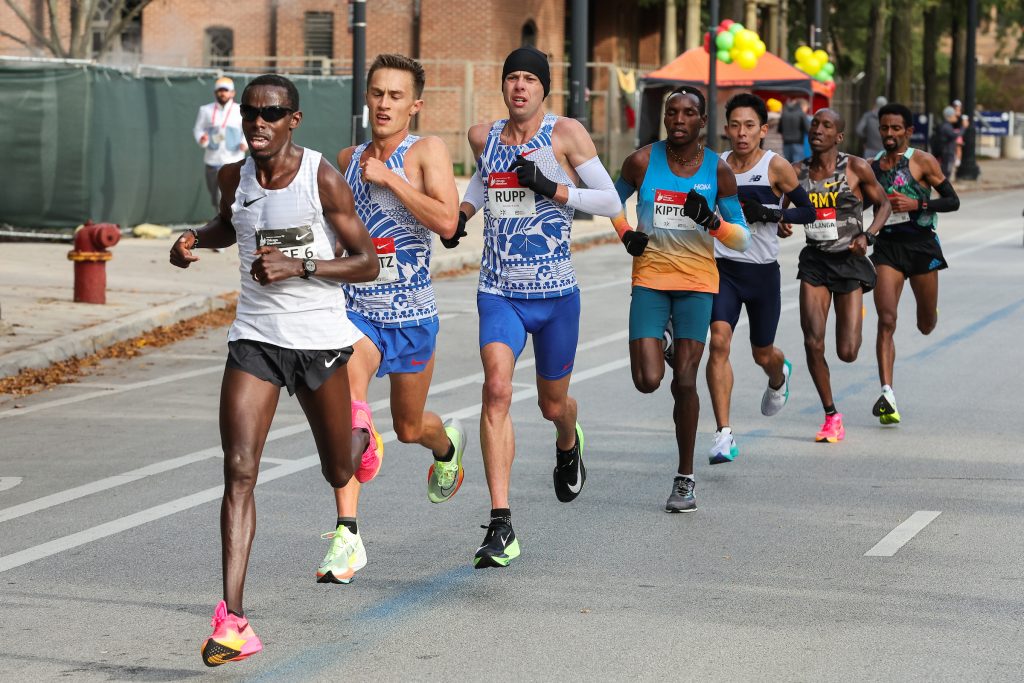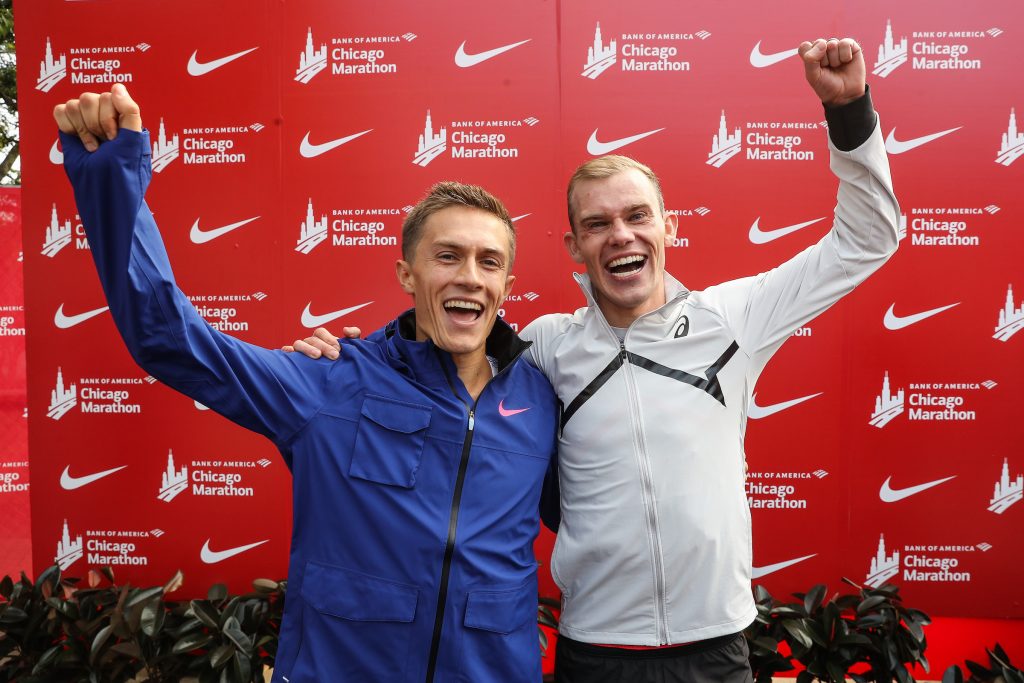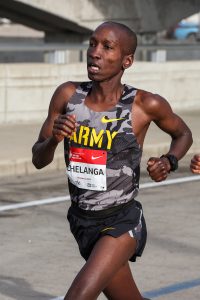Conner Mantz (2:07:47) & Clayton Young (2:08:00) Hit Olympic Standard as Rupp Misses at 2023 Chicago Marathon
At least two Americans will be in Paris next year; Galen Rupp runs 2:08:48 in return
By Jonathan GaultCHICAGO — Heading into Sunday’s Bank of America Chicago Marathon, no American man had earned the 2024 Olympic automatic qualifying standard of 2:08:10 — a source of consternation for US marathoners with the Olympic Trials in Orlando less than four months away. For the United States to send a full contingent of three men to Paris, Americans must “unlock” each spot, either by running under the qualifying time, placing in the top five in a Platinum Label Marathon, or by world ranking. Because the latter is a byzantine, hard-to-follow process that will not be fully finalized until April, the most attention had been on getting men to run under the time — not easy considering only six Americans had ever run 2:08:10 or faster before today.
Now, thanks to the dynamic duo of Conner Mantz and Clayton Young, we know there will be at least two male American marathoners in Paris next summer. Mantz, 26, and Young, 30, college teammates at BYU who now train together in Provo, Utah, took advantage of favorable conditions (temps in the 40s, 8 mph wind) and a fast course to clock a pair of personal bests in Chicago on Sunday. Mantz ran 2:07:47 to finish 6th and Young 2:08:00 for 7th, in the process unlocking two Olympic spots for Americans. Whether Mantz and Young fill those spots will depend on USATF’s selection policy and the outcome of February’s Olympic Trials, but some of the stress and uncertainty that surrounded the Olympic qualifying process has been alleviated.
“That was our #1 priority, let’s get 2:08:10 underway, let’s open up that window for all of the Americans, and let’s just get some PRs,” said Mantz and Young’s coach Ed Eyestone, a US Olympic marathoner himself in 1988 and 1992. “[I told them], let’s also celebrate the fact that we’re going to take at least two Americans to the Olympic Games and you guys have provided that opportunity for at least two men. Now I hope it’s them! But if it’s not, I think they can take some pride that they’ve provided at least two opportunities.”
All the Americans struggle the final 5 miles, US sets record for most sub 2:09s in one race
America almost got three qualifiers for the Olympics– and could still depending on how the world rankings shake out over the next few months. At 35k, Sam Chelanga (2:06:59 pace) and Galen Rupp (2:07:17 pace), collegiate rivals 15 years ago, were both well under standard pace before the wheels fell off. Chelanga would run the final 7.195k in 23:20 (2:17 marathon pace) while Rupp would run it in 23:15 (2:16 marathon pace), leaving Rupp 8th in 2:08:48 and Chelanga 9th in 2:08:50.
Rupp, the 2017 Chicago champion, declined an interview request but told LetsRun his run was a step in the right direction after spending the last two years battling a back injury. For the 38-year-old Chelanga, who had never run better than 2:15 in his first four marathons, 2:08:50 represented a massive breakthrough.
The four sub-2:09s by Americans in Chicago were easily the most ever. In fact, there had only been one other marathon in which two Americans broke 2:09 — the famous Duel in the Sun in Boston in 1982 between Alberto Salazar (2:08:51) and Dick Beardsley (2:08:53). Of course, we are living in an entirely different era of marathoning thanks to the ultra-cushioned supershoes that have taken over the sport and shaved minutes off of times.
With Chicago representing one of the final opportunities for Americans to hit the Olympic standard, a number of men ran aggressively with Rupp, Mantz, Chelanga, and Daniel Mesfun (an Eritrean who earned US citizenship last year and would end up a DNF) hitting halfway in 63:21. Mantz came the closest to holding it and was still on pace for his pre-race goal of sub-2:07 through 35k (which he hit in 1:45:10 — 2:06:47 pace).
“I was very convinced I could run under 2:07 today but my last 4k was a little brutal,” Mantz said, adding that he had to run mostly alone from 30k to the finish. “Eventually Sam Chelanga caught up to me but sadly it was like a bouncy ball where he caught up to me and he bounced right off. I was hoping to run with him some more. But it was really a good run. I’m really excited about my race.”
Just behind Mantz, Young was running a different kind of race. He had been tasked by Eyestone with walking a fine line: go out fast enough to make the Olympic standard a possibility, but not so fast that he got caught up with Mantz, Rupp, and the others chasing 2:06. Eyestone described it as “patience, followed by destruction.”
Young could not have executed much better. He hit halfway in 16th in 63:42 (patience) and came home in 64:18, passing nine guys over the second half (destruction).
“To close on [Mantz] the last little bit and to be able to finish right behind him, like I usually do in practice was a really big step for me,” said Young, who had never run faster than 2:11 in three previous marathons. “I’m really grateful to have him as a training partner.”
Quick Take: Conner Mantz gets it done and logs another solid marathon
Mantz debuted in 2:08:16 in Chicago last year to finish 7th, then ran 2:10:25 for 11th in Boston and today was 6th in 2:07:47, tied with Dathan Ritzenhein for 4th on the all-time US list. He still believes he is capable of more — and based on how well he was running through 35k, he’s probably right — but he has been as advertised so far as a professional. When Mantz left BYU after winning his second consecutive NCAA cross country title in November 2021, Rupp and Leonard Korir were the only Americans to have broken 2:08 since Ritz did it for the first and last time at 2012 Chicago.
Mantz now owns the two fastest marathon times by an American since he turned pro. And while he’s pleased with his run today — and especially pleased to have knocked out the Olympic standard — Kelvin Kiptum‘s 2:00:35 world record will keep him humble.
“If I’m seven minutes off the world record, I need to step up if I want to compete on the international scene,” Mantz said.
Quick Take: Clayton Young bounces back from February knee surgery to run 2:08:00 eight months later
There have been signs that Young was ready for a breakthrough in Chicago. He ran 22:46 to win the US 8k title back in July and followed that up by winning the US 20k title last month in New Haven in a race where he and Mantz finished together. But Young, the 2019 NCAA 10,000 champ on the track, had never been able to put it together for 26.2 miles before today. Even more amazingly, he ran his big pb after undergoing knee surgery just eight months ago.
The two things are not unrelated. Young said that the main reason he was able to run fast today was he put together a longer buildup — 16 weeks as opposed to 10-12 in previous years — and ran more miles (several 120-mile weeks in a row — in six days — compared to a max of 115 in the past). And the reason he could do that was he took care of the knee pain that had bothered him earlier in the year by having surgery.
Young’s doctor diagnosed his issue as plica syndrome, which happens when there is swelling within the membrane that protects the knee. He tried addressing it with a cortisone shot — and even a glucose shot — but ultimately opted for surgery in February. Though he didn’t miss that much time — he began cross-training two weeks later and was soon back to running — he was not fit in the first half of the year. In his first race back, the Bolder Boulder 10K on May 30, he finished 11th in 30:16.
“I got slaughtered,” Young said. “That was pretty tough, to be honest.”
But Young said he drew strength from Mantz and another training partner, 2016 Olympian Jared Ward, to help him restore his confidence and fitness. By Chicago, he knew he was ready to go and delivered with a personal best of nearly four minutes.
“I am so grateful for them as training partners, not only in running but in life,” Young said.
Between Mantz (2:07:47 pb), Young (2:08:00 pb) and Ward (2:09:25 pb), coach Ed Eyestone now has a very impressive group of marathoners in Provo — all of them Utah natives and BYU alums.
Quick Take: Galen Rupp did not get the race he wanted but you’d be foolish to count him out of the Olympic Trials
Rupp was confident ahead of Chicago and did not think he’d have any issue earning the Olympic standard of 2:08:10, but it did not end up that way as he faded to 2:08:48 and 8th at the finish — the first time in 11 marathon finishes that an American had beaten Rupp.
Clearly, the 37-year-old Rupp still has some work to do, but the fact that his body could make it through 26.2 miles intact is a massive step forward from where he was at this time last year. And, crucially, Rupp hit the quota reallocation time of 2:11:30, meaning he does not necessarily need to run sub-2:08:10 at the Trials to get on the team. If he can log four more healthy months of training ahead of the Trials, he will be dangerous in Orlando.
Quick Take: Sam Chelanga is back!
Anyone watching the finish of Chicago today was treated to a sight similar to the classic 2008 NCAA Cross Country Championships where Rupp and Chelanga battled it out down the final straight in Terre Haute. Rupp won both battles but running 2:08:50 was a victory in and of itself for Chelanga, who has fast pbs at other distances (13:04 5k, 27:08 10k, 60:37 half) but had never put it together in a marathon.
It took a long time for Chelanga to get there. Coming out of Liberty in 2011, Chelanga ran professionally for Nike until retiring in 2018 to join the Army. But Chelanga couldn’t shake the running bug and quickly joined the Army’s World-Class Athlete Program, whom he still represents. Even as recently as April, when he ran 2:20:20 for 30th in Boston, Chelanga was still struggling with the marathon, but now, at 38, he is a 2:08 guy and a contender at the Trials.
Quick Take: It’s still up in the air as to whether the US will get three men to the Olympics
We know that the US will have at least two men in the 2024 Olympic marathon. USATF hasn’t announced its official selection procedure yet but it is likely that the top two finishers at the Trials will be on the team, as long as they’ve hit the quota reallocation time of 2:11:30.
What about the third spot? It’s hard to forecast it right now. At the moment, the US has three men in the top 64 of the world rankings (limiting it to three athletes per country) but it’s not the world rankings that will matter when it comes to Olympic qualification — it’s the “Road to Paris” list, which includes athletes with the auto standard and only factors in performances since the qualifying window opens on November 1, 2022. Anyone in the top 64 of that list on January 30 will unlock an Olympic spot for their country, with the remaining 16 spots awarded at the end of the qualifying window on April 30.
Projecting that list is very difficult so it’s hard to say exactly where Americans stack up (World Athletics said it will make the Road to Paris list available on its website this fall and update it as performances roll in). Matt McDonald was one of the highest-ranked Americans entering today and finished 13th in Chicago in 2:10:34, which is worth 1151 points (he did not earn any bonus points, which only go 12 deep in Chicago). Average that with his 1172 points from Boston this year and you get 1161 points, which would place him 69th on the current world rankings (limiting it to three athletes per country). But that list is going to change a lot between now and January, and some names will come off since it includes athletes’ performances prior to November 2022.
So it’s a waiting game for the Americans at the moment since most of the best guys have already run their fall marathon. Elkanah Kibet (currently ranked 5th in the US) and Futsum Zienasellassie (7th) are both running New York on November 5, though, and either could unlock the third spot by finishing in the top 5 there.
There is one other option. An athlete’s marathon world ranking is based on their two best performances, but one of those performances can be a half marathon. If an American with one good marathon mark who is not currently qualified runs a fast half between now and the Trials and boosts his ranking, the US could earn the third spot that way.





